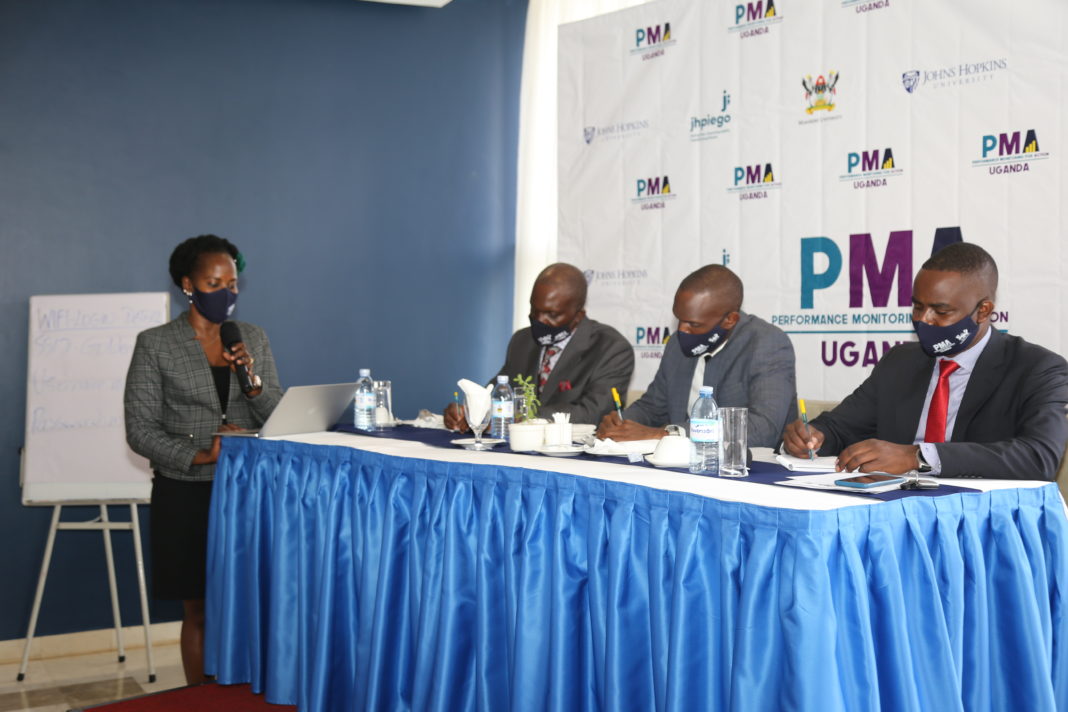The study by the Performance Monitoring for Action Uganda project -PMA has revealed that in the year 2021, the use of modern methods of Family Planning was embraced more by the women of childbearing age compared to 2020.
According to the study, a substantial increase in the use of modern contraception from 30 percent to 34 percent in 2021 was observed among all women. Among women who were not currently using contraception, only one in five intends to use contraception in the next 12 months. It also reveals that women continue to report high levels of unintended pregnancies.
The study which was conducted nationally in women aged between 15 to 49, from September to November 2021, shows that the proportion of public facilities offering IUDs and implants, and maintaining a stock of these commodities have been steadily increasing overtimes.
However, on counseling and outreach, the study findings show a low percentage of women reported receiving a comprehensive contraceptive counseling. Only 2 in 5 contraceptive users report receiving comprehensive information on family planning methods use, adding that the availability of comprehensive contraceptive counseling continues to be low among women who are current users of modern contraceptive methods
“Adolescent girls between 15 to 19 years were less likely than women aged 20 and over to receive family planning information from primary care or community health providers.” The study reveals.
The study further revealed stock-outs of family planning services at service delivery points have limited uptake of these family planning services.
“The stockouts have been reported highly among the long-acting reversible contraceptive methods-LARCs like implants and intrauterine devices-IUDs” it noted.
Speaking at the dissemination meeting in Kampala on Tuesday, Dr. Fredrick Makumbi, and the study team leader, revealed that in public facilities, IUD was at 66 percent, and nearly 8 percent were out of stock by the study time. He further adds that for the past three years, 21 percent of implants were out of stock, and 9 percent by survey time.
He further reveals how 71 percent of injectables were stocked in the facilities by the time this survey was done, but about 18 percent were out of stock.
According to the study, oral contraceptive pills, in half of the facilities were out of stock at the time of this study or for the last three months.
Dr. Richard Mugahi, the assistant Commissioner for Reproductive and infant Health at Health Ministry noted that distribution is one of the biggest mechanisms that will solve the challenge of stock-outs since every district is having two pickups.
The commissioner is also concerned with the reproductive health supplies, adding that as Health ministry, they are going to provide them to private health facilities if they are registered and recognized by the district teams.
Findings revealed that the proportion of women using family planning is standing at 40 percent, whereby married women who use any methods were currently 50.2 percent, and 43 percent being married women who embraced only modern methods of family planning.
From the Department of Community Health and Behavioral Sciences, Dr. Simon Peter Kibira, who is part of the team that carried out this survey noted that the challenge is in the quality of services which are given out while trying to address the family planning matters.
Dr. Betty Kyaddondo, the Director of Family Health at the National Population Council, in her remarks said that there is a great need to work with community health workers and Village Health Teams if there is a need to improve on family planning service delivery.
Family Planning and Health Service Access Barriers as a result of Covid-19
The study shows that women who wanted to access a health facility reported more success in accessing health facilities in 2021 compared to 2020. It reported how women experienced difficulties in accessing health services for family planning declined from 46 percent in 2020 to 24 percent in 2021.
“Among women who reported difficulties in accessing health facilities, and improved access to transport and reduced fear of getting infected to COVID-19 at health facilities was found in 2021, compared to 2020”.
Nearly all health facilities (97%) remained open during the recent COVID-19 restrictions period, and women who wanted to access a health facility reported more success in accessing health facilities in 2021 compared to 2020.
Performance Monitoring for Action Uganda project –PMA is implemented by Makerere University School of Public Health-MakSPH, in collaboration with the Uganda Bureau of Statistics and the Ministry of Health. Overall direction and support of PMA are provided by the Bill & Melinda Gates Institute for Population and Reproductive Health at the Johns Hopkins Bloomberg School of Public Health and Jhpiengo.






